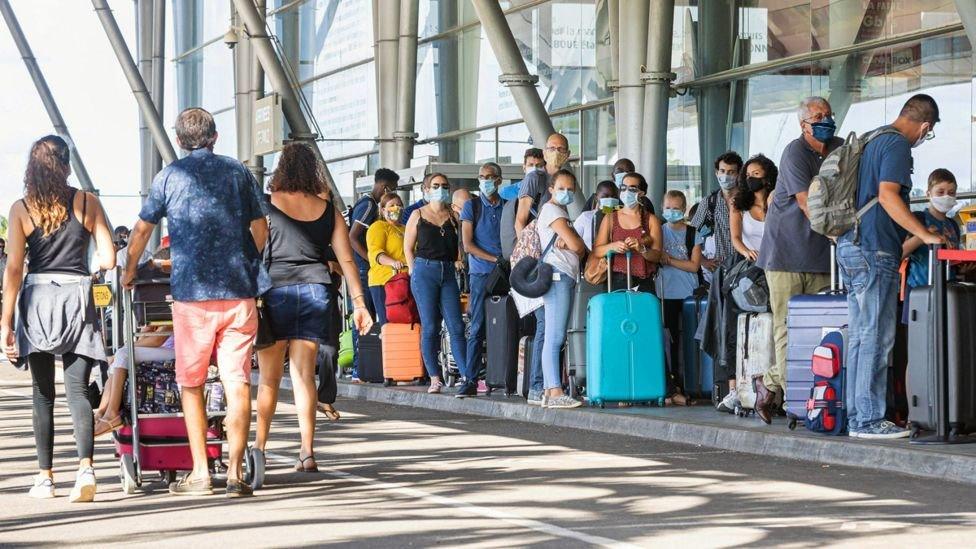Coronavirus: 'Personal responsibility needed to live with Covid'
- Published

Amid rising case numbers, Paul Givan says deaths from the virus have been significantly reduced
A move to a "very high level of personal responsibility" will be the best way to live with Covid-19, NI's first minister has said.
Amid rising case numbers, Paul Givan said deaths from the virus have been significantly reduced.
He said it was through this criteria that judgements should be made on "draconian" restrictions.
He also questioned the "logic" of wearing face masks in settings where people are seated.
Mr Givan said there was a "danger where the public have moved way beyond where the politicians are" on issues such as indoor gatherings.
On Thursday, the executive agreed a further easing of some restrictions.
From 26 July, fully vaccinated people returning to Northern Ireland from so-called 'amber' countries will not have to quarantine.
Theatres could also reopen then, while the requirement for face coverings to be worn in places of worship could also be removed.
Most of the proposals will need to be ratified by ministers on 22 July.
The decisions mean Northern Ireland will deviate from England's roadmap, where it is expected all legal restrictions will end on 19 July.
BBC News NI understands the executive will consider ending restrictions on mandatory face coverings, social distancing and isolating at a meeting in August.

The first minister says he does "not see the justification" for mandatory face coverings in venues such as a cinema, theatre, a concert or in church
Speaking to Good Morning Ulster on Friday, Mr Givan said: "There are some issues where I felt we could have moved more quickly; obviously some colleagues around the table were taking a different view."
He said Northern Ireland had a "very restrictive regime" on the number of people who could gather inside a private home, which is expected to be 10 people from three households from 26 July.
It comes as one Covid-19 related death was registered in Northern Ireland in the week to last Friday, 2 July 2021.
The government statistics agency NISRA said that was a decrease of one on the previous week.
It brings the agency's total to 2,982. The Department of Health's total for the same date, based on a positive test result being recorded, was 2,156.
NISRA's figures are higher, because it records mentions of the virus on death certificates, where it may or may not have been confirmed by way of a test.
'Cautious and steady approach'
The first minister said he did "not see the justification" for mandatory face coverings in venues such as a cinema, theatre, a concert or in church.
"I wouldn't see why in a sedentary position where you're not moving about that that is something that is required," he said.
"The public again see people sitting in restaurants at tables where they're eating food and they're drinking and they're not having to wear a face mask to do that, I do think where you're still moving about in buildings I can understand why there is an argument about that."

Paul Givan said face coverings should not be required in settings such as a church
On Thursday, Deputy First Minister Michelle O'Neill said the executive had agreed on a "cautious" and "steady" approach to easing restrictions.
She repeated her criticism of the UK government's plan to end restrictions in July, accusing Prime Minister Boris Johnson of taking a "reckless approach".
Earlier, Northern Ireland's chief medical officer Sir Michael McBride had warned it was "important to guard against" mixed messaging on issues such as face masks.
However, he said the policy was "ultimately a matter for ministers".
Mr Givan said the key data for ministers to consider was the link between the virus and the number of hospitalisations and deaths.
He explained: "We can see in the statistics that while the transmission rate has been increasing, thankfully the number of people who have been dying from this illness has not been anywhere near where it had been in the previous occasions whenever this occurred.
"That is down to the success of the vaccination programme."
Related topics
- Published29 July 2021

- Published8 July 2021
